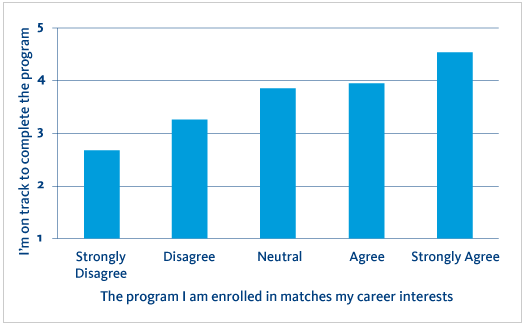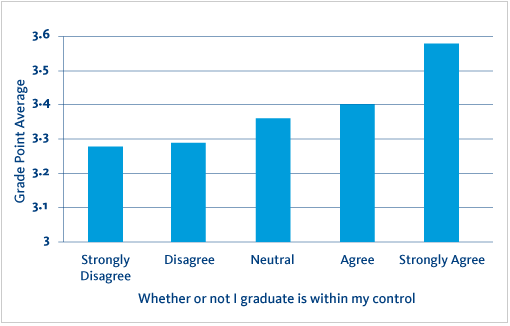Do you know what types of students you should be enrolling to ensure the best outcomes? Learn about three characteristics that drive student engagement.
We recently completed a study in conjunction with the Imagine America Foundation to determine what factors affect student engagement.
There are three defined characteristics of engaged students. First, engaged students are interested in the material. Our research found that interested students are more likely to perform well and complete their programs. Take a look at this graph.

You can see that students who felt that the programs they enrolled in matched their career interests also felt that they were more on track to complete their program.
In addition, the study found that students whose interests matched their programs also felt that they were learning more. Part of being successful is loving what you do. Know your students’ interests and place them into programs that match those interests. By doing so, your students will be more engaged.
Second, engaged students believe that they are in control of their destiny and attribute success and failure to internal factors – that is, factors that are directly under their control. For example, if they were to fail on a test, they might attribute it to a lack of preparedness on their part, as opposed to the test being too hard. If they succeed, they might attribute it to the hard work they put in studying, as opposed to being lucky. This graph displays the relationship between GPA and how students feel about their control over their ability to graduate.

Our analyses found that students who believe that graduating is within their control have higher grade point averages. Students who accept responsibility for their failures are also those who believe that they can do better. These students might seek help from the teacher, attend more classes, and study harder. To this end, choose students who believe they are in control of their successes, as well as failures, in school.
Finally, to succeed is no small task; nor is it an individual one. Students are more likely to progress through a program if they have a strong support system at home and school. We found that students who felt that the important people in their lives, such as their family and friends, support their decision to go to school were also more satisfied with their progress towards completing their education.






